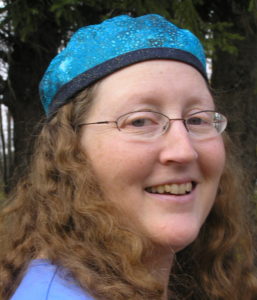Commentary on Parshat Bereshit (Genesis 1:1 – 6:8)
The story of humanity in the Torah begins with homelessness. The first two humans, Eve/Chava (“Mother of all life”) and Adam (“Earthling”) are unhoused vegetarian nudists living in bliss – and blissful ignorance – in the bubble of perfection of the Garden of Eden. There is no need for money or property, the weather is so pleasant that they don’t actually need clothes, there is abundant food, they don’t have any children to look after, and their only responsibilities are tending the garden.
Sign up to receive Torah from T’ruah in your inbox each week!
Once Eve and Adam leave the garden, they begin to experience the brokenness of the outside world. As we continue through the Torah, we read of people who live in tents, then houses. Eventually we read about Sukkot, the holiday of booths. The sukkah is a deliberately fragile shelter that exposes us to the possibility of rain and wind, “so that your generations know that I made the children of Israel dwell in sukkot when I brought them out from the land of Mitzrayim” (Lev. 23:44). Sukkot re-enacts the ancestral experience of being homeless refugees. At the same time, Sukkot was a harvest holiday where we brought offerings and cultivated gratitude. Sukkot lets us know that our connection to the Divine Consciousness and to each other is our true prosperity, and that material possessions (including the more beautiful etrogim [citrons] that some people pay more for, ironically), while we may enjoy them, do not last.
While none of us are living in the Garden of Eden, those of us who’ve never had to question whether we would find ourselves homeless live in a kind of “bubble of the permanently housed.” This bubble has given rise to myths about homelessness that blame the homeless for homelessness and ignore policies that, intentionally or unintentionally, perpetuate income inequality, poverty and homelessness.
Myth #1: Homelessness is caused by moral failings such as alcoholism, drug addiction, or sloth.
Reality: Privilege masks the alcoholism, drug addiction and mental illness of many people who just happen to have enough money, benefits and supports to remain housed. There are plenty of people at risk of homelessness who are intelligent, hard-working, and determined, yet face challenges that people in the “bubble of the permanently housed” have never had to think of. Many homeless people in my county work diligently at one, two, or even three jobs. Those with full-time work often can’t afford housing near their jobs, and bus service from the cheaper outlying areas is limited, so they are forced to choose between affordable housing and affordable transportation.
Myth #2: Homeless people are ignorant, uneducated and unskilled.
Reality: Market-rate rents in Ithaca, NY, where I live, are so high that a newly certified teacher in a neighboring school district was unable to afford a modest apartment downtown. At the free clinic, patients who have to choose between rent and health care include adjunct professors, licensed massage therapists, and self-employed business owners.
Myth #3: Homeless people are single adults.
Reality: In our school district, there are children from working families facing homelessness who don’t have a table or desk where they can do their homework, and whose parents have had to choose between paying the rent and keeping enough food on the table. If not for the Children’s Health Insurance Program, they wouldn’t get medical care either.
Myth #4: Homelessness happens to people we don’t know.
Reality: Last year, a colleague revealed to me that her brother, who is college-educated and self-employed, had become homeless when health problems forced him to reduce his workload.
 This Sukkot, let the sukkah remind you of just how easily people can find themselves and their families facing homelessness. If you’ve been in the “bubble of the permanently housed” be aware that there is no such thing as being permanently housed. Take the opportunity to look outside with compassion. When you see someone who is homeless, check your assumptions. Advocate for policies that don’t punish people for becoming homeless and instead remove the barriers that perpetuate homelessness in our society.
This Sukkot, let the sukkah remind you of just how easily people can find themselves and their families facing homelessness. If you’ve been in the “bubble of the permanently housed” be aware that there is no such thing as being permanently housed. Take the opportunity to look outside with compassion. When you see someone who is homeless, check your assumptions. Advocate for policies that don’t punish people for becoming homeless and instead remove the barriers that perpetuate homelessness in our society.
Cantor Abbe Lyons serves as a Hillel professional at both Ithaca College and Binghamton University, and is on the faculty of the ALEPH Ordination Program in which she was ordained. Her latest CD with Resonate, Listen! features dynamic musical settings of Jewish texts including Isaiah’s charge to “bring the poor, the outcast, to your house.”


